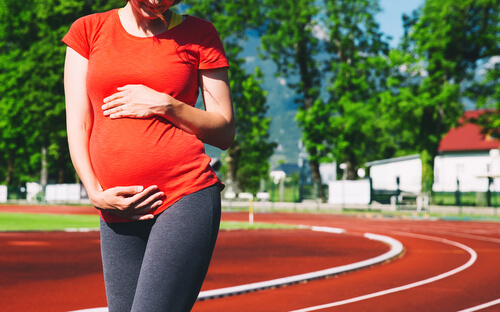Walking During Pregnancy: How Far and How Fast?

In this article, we’ll look at how walking during pregnancy can help you maintain a healthy weight and prepare for childbirth.
Keeping up a moderate exercise routine during pregnancy offers major health benefits for a mom-to-be. But overly strenuous or high-impact activities may put the baby’s health and growth at risk.
With this in mind, many women take up walking during pregnancy, as well as activities such as yoga or pilates.
The benefits of walking during pregnancy
Walking is an easy, gentle way to exercise. It’s open to all, regardless of age, weight and physical fitness.
What’s more, walking doesn’t require access to a gym or specific equipment. You can do it anywhere and at any time of the day.
Aside from being practical, simple and cheap, walking during pregnancy also offers multiple health benefits for women. Some of the most important advantages include:
Managing weight gain during pregnancy
Walking is a low-impact aerobic activity that burns calories without putting excessive strain on the body.
This means that a regular stroll can help pregnant women maintain a healthy weight and prevent conditions associated with obesity, such as gestational diabetes and high blood pressure.
Better circulation
A brisk walk improves the flow of blood throughout the body and helps to prevent edema.
For pregnant women, better circulation also reduces swelling of the feet and ankles and decreases the risk of hemorrhoids and carpal tunnel syndrome.

Regulating heart rate and breathing
Weight gain during pregnancy and the pressure caused by the growth of the fetus can lead to breathing difficulties and an altered heart rate.
When it comes to maintaining a balanced respiratory rhythm and preventing cardiovascular disease, a daily walk is your friend.
Better self-esteem for a healthier pregnancy
During pregnancy, women go through a wide range of hormonal and physiological changes. These can lead to emotional ups and downs that dent our self-esteem.
By releasing endorphins, regular exercise helps to stabilize our mood.
An easier birth and a quicker recovery
The rhythmic movement of the pelvis when we walk helps to develop the muscles in this area of the body.
These movements also help promote dilation when the time comes, preparing the body for the moment of birth.
What’s more, walking during pregnancy helps strengthen the leg muscles and leads to better overall physical fitness.
This helps a woman’s body deal with the weight that she gains during pregnancy and builds strength for a more straightforward birth.
Walking also reduces cramps and helps women resist contractions during labor.
New moms also feel the benefits of their exercise regime during pregnancy as they recover from giving birth.
The muscle tone and fitness achieved through regular physical activity will help you get through the postpartum period with fewer aches and pains.
How far should a pregnant woman walk each day?
The distance that pregnant women should walk will depend on their individual characteristics as well as stage of pregnancy. A healthy minimum to aim for to prevent excess weight gain is 30 minutes a day.
For the first 8 months of pregnancy, however, walking for an hour a day can boost the benefits of this physical activity.
These 60 minutes of exercise can be split up into 3, 4 or 5 short strolls, keeping up a regular pace and pausing to rest when necessary.
Remember to drink water to stay hydrated and replace the fluid lost during exercise. This is especially important for moms-to-be.
During the final month of pregnancy, many doctors suggest walking for at least two hours a day.
This doesn’t have to mean a daunting 120-minute march, however. Split the time up into different outings and always take time to rest.

How fast should I walk during pregnancy?
Every woman knows her own body. The ideal pace to walk at will depend on how fit you are. However, it’s always important to start off slowly and gradually increase your pace.
It’s also important to bear in mind that any exercise during pregnancy should be moderate, regular and rhythmic.
If you experience shortness of breath, fatigue, discomfort or a feeling of heaviness in your body when you walk, reduce your pace or stop the activity altogether.
Finally, remember to speak to your doctor before you take up any new physical activity. Along with exercise, sticking to a balanced diet is also key to a healthy pregnancy and a more active routine.
In this article, we’ll look at how walking during pregnancy can help you maintain a healthy weight and prepare for childbirth.
Keeping up a moderate exercise routine during pregnancy offers major health benefits for a mom-to-be. But overly strenuous or high-impact activities may put the baby’s health and growth at risk.
With this in mind, many women take up walking during pregnancy, as well as activities such as yoga or pilates.
The benefits of walking during pregnancy
Walking is an easy, gentle way to exercise. It’s open to all, regardless of age, weight and physical fitness.
What’s more, walking doesn’t require access to a gym or specific equipment. You can do it anywhere and at any time of the day.
Aside from being practical, simple and cheap, walking during pregnancy also offers multiple health benefits for women. Some of the most important advantages include:
Managing weight gain during pregnancy
Walking is a low-impact aerobic activity that burns calories without putting excessive strain on the body.
This means that a regular stroll can help pregnant women maintain a healthy weight and prevent conditions associated with obesity, such as gestational diabetes and high blood pressure.
Better circulation
A brisk walk improves the flow of blood throughout the body and helps to prevent edema.
For pregnant women, better circulation also reduces swelling of the feet and ankles and decreases the risk of hemorrhoids and carpal tunnel syndrome.

Regulating heart rate and breathing
Weight gain during pregnancy and the pressure caused by the growth of the fetus can lead to breathing difficulties and an altered heart rate.
When it comes to maintaining a balanced respiratory rhythm and preventing cardiovascular disease, a daily walk is your friend.
Better self-esteem for a healthier pregnancy
During pregnancy, women go through a wide range of hormonal and physiological changes. These can lead to emotional ups and downs that dent our self-esteem.
By releasing endorphins, regular exercise helps to stabilize our mood.
An easier birth and a quicker recovery
The rhythmic movement of the pelvis when we walk helps to develop the muscles in this area of the body.
These movements also help promote dilation when the time comes, preparing the body for the moment of birth.
What’s more, walking during pregnancy helps strengthen the leg muscles and leads to better overall physical fitness.
This helps a woman’s body deal with the weight that she gains during pregnancy and builds strength for a more straightforward birth.
Walking also reduces cramps and helps women resist contractions during labor.
New moms also feel the benefits of their exercise regime during pregnancy as they recover from giving birth.
The muscle tone and fitness achieved through regular physical activity will help you get through the postpartum period with fewer aches and pains.
How far should a pregnant woman walk each day?
The distance that pregnant women should walk will depend on their individual characteristics as well as stage of pregnancy. A healthy minimum to aim for to prevent excess weight gain is 30 minutes a day.
For the first 8 months of pregnancy, however, walking for an hour a day can boost the benefits of this physical activity.
These 60 minutes of exercise can be split up into 3, 4 or 5 short strolls, keeping up a regular pace and pausing to rest when necessary.
Remember to drink water to stay hydrated and replace the fluid lost during exercise. This is especially important for moms-to-be.
During the final month of pregnancy, many doctors suggest walking for at least two hours a day.
This doesn’t have to mean a daunting 120-minute march, however. Split the time up into different outings and always take time to rest.

How fast should I walk during pregnancy?
Every woman knows her own body. The ideal pace to walk at will depend on how fit you are. However, it’s always important to start off slowly and gradually increase your pace.
It’s also important to bear in mind that any exercise during pregnancy should be moderate, regular and rhythmic.
If you experience shortness of breath, fatigue, discomfort or a feeling of heaviness in your body when you walk, reduce your pace or stop the activity altogether.
Finally, remember to speak to your doctor before you take up any new physical activity. Along with exercise, sticking to a balanced diet is also key to a healthy pregnancy and a more active routine.
All cited sources were thoroughly reviewed by our team to ensure their quality, reliability, currency, and validity. The bibliography of this article was considered reliable and of academic or scientific accuracy.
- Amezcua-Prieto C, Naveiro-Fuentes M, Arco-Jiménez N, Olmedo-Requena R, Barrios-Rodríguez R, Vico-Zúñiga I, Manzanares Galán S, Mozas-Moreno J, Jiménez-Moleón JJ, Gallo-Vallejo JL. Walking in pregnancy and prevention of insomnia in third trimester using pedometers: study protocol of Walking_Preg project (WPP). A randomized controlled trial. BMC Pregnancy Childbirth. 2020 Sep 10;20(1):521.
- Kong KL, Campbell C, Wagner K, Peterson A, Lanningham-Foster L. Impact of a walking intervention during pregnancy on post-partum weight retention and infant anthropometric outcomes. J Dev Orig Health Dis. 2014 Jun;5(3):259-67.
- Khoram S, Loripoor M, Pirhadi M, Beigi M. The effect of walking on pregnancy blood pressure disorders in women susceptible to pregnancy hypertension: A randomized clinical trial. J Educ Health Promot. 2019 May 14;8:95.
- Ribeiro MM, Andrade A, Nunes I. Physical exercise in pregnancy: benefits, risks and prescription. J Perinat Med. 2021 Sep 6;50(1):4-17.
- Ruchat SM, Davenport MH, Giroux I, Hillier M, Batada A, Sopper MM, Hammond JA, Mottola M. Walking program of low or vigorous intensity during pregnancy confers an aerobic benefit. Int J Sports Med. 2012 Aug;33(8):661-6.
- Taniguchi C, Sato C. Home-based walking during pregnancy affects mood and birth outcomes among sedentary women: A randomized controlled trial. Int J Nurs Pract. 2016 Oct;22(5):420-426.
This text is provided for informational purposes only and does not replace consultation with a professional. If in doubt, consult your specialist.








